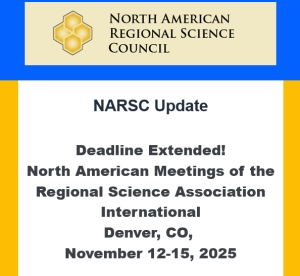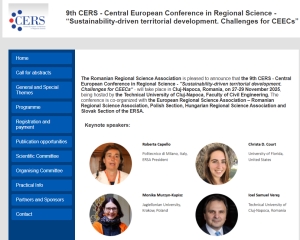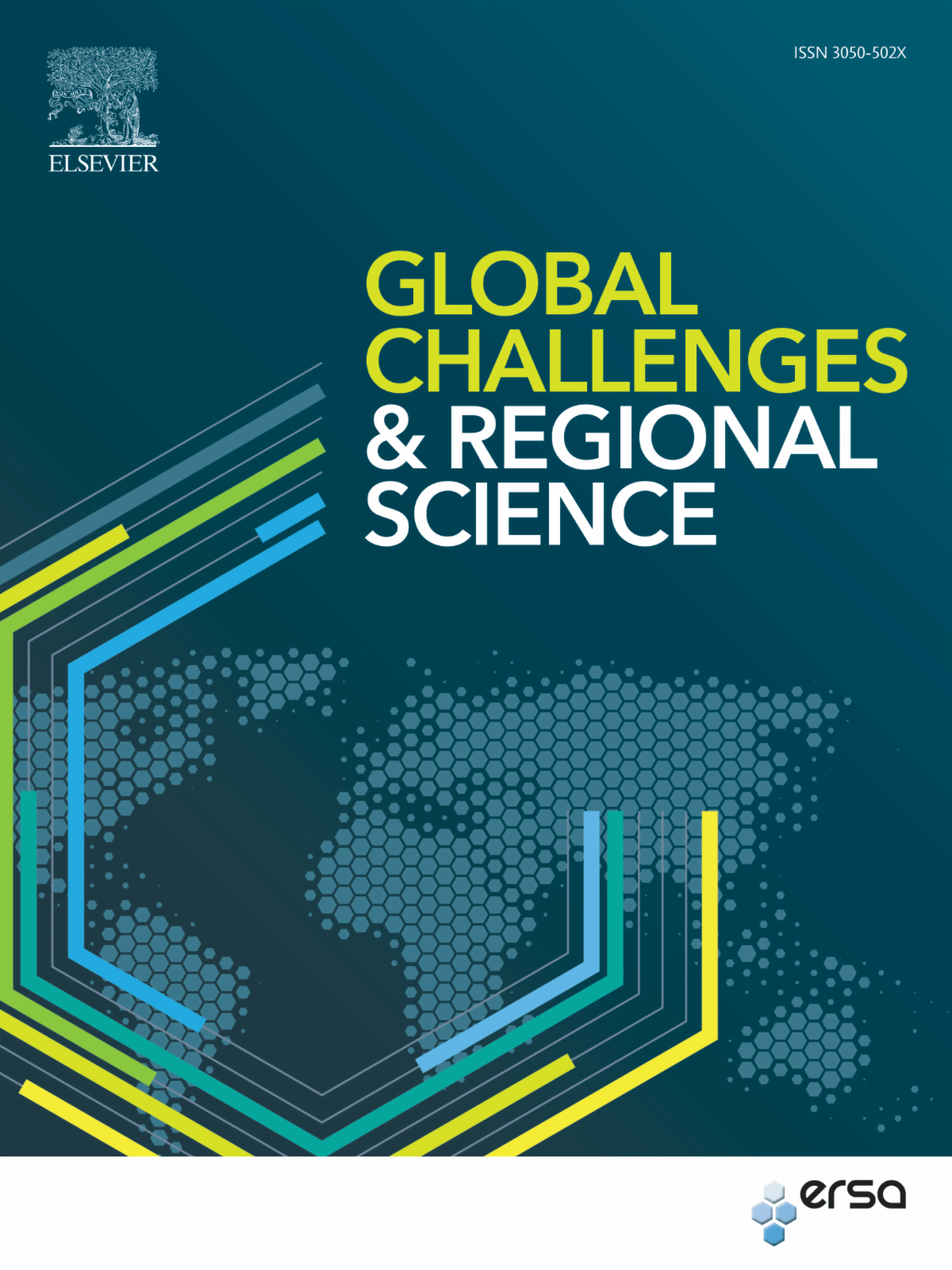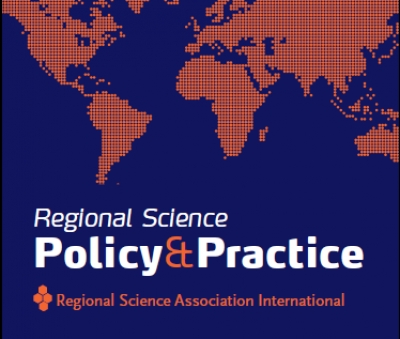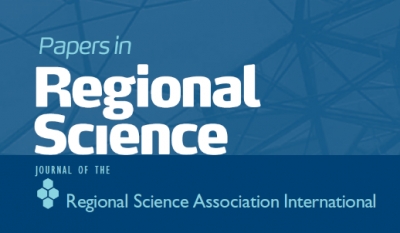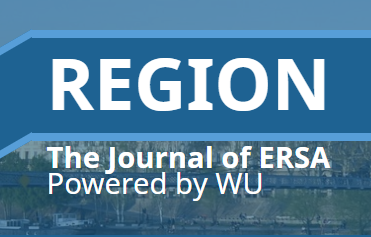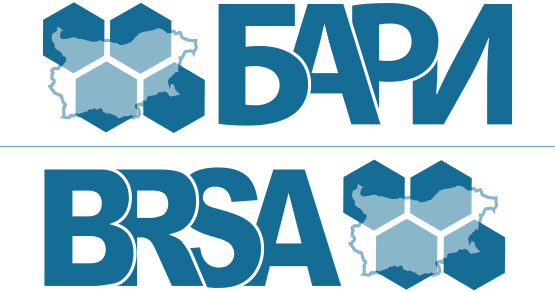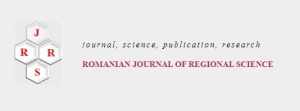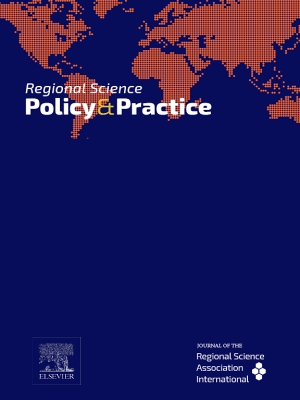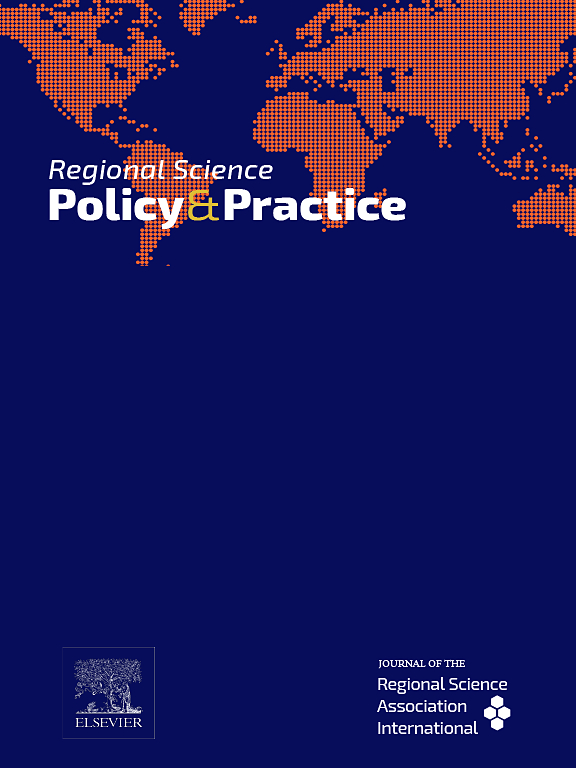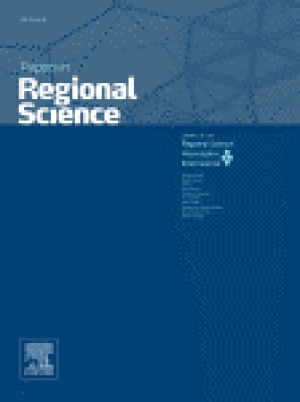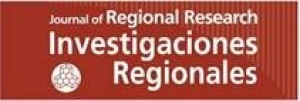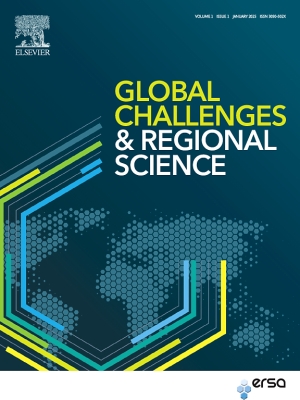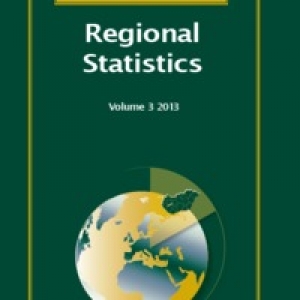Presidents
Elisabete Martins
NARSC 2025 CFP Extended to July 24
|
Romanian, Polish, Hungarian and Slovak Section: 9th Central European Conference in Regional Science (CERS), 27-29 November 2025, Cluj-Napoca, Romania
9th Central European Conference in Regional Science (CERS)
Sustainability-driven territorial development. Challenges for CEECs
27-29 November 2025, Cluj-Napoca, Romania
The Romanian Regional Science Association is pleased to announce that the 9th CERS – Central European Conference in Regional Science – “Sustainability-driven territorial development. Challenges for CEECs” – will take place in Cluj-Napoca, Romania, on 27-29 November 2025, being hosted by the Technical University of Cluj-Napoca, Faculty of Civil Engineering.
The conference is co-organized with the European Regional Science Association – Romanian Regional Science Association, Polish Section, Hungarian Regional Science Association and Slovak Section of the ERSA.
Further details and the Call for Papers will be announced in due course.
Keynote speakers:

More Information at https://www.cers.rrsa.ro/
ERSA Monthly E-news - June 2025
|
||||||||||||||||||||||||||||||||||||||||||||||||||||||||||||||||||||||||||||||||||||||||||||||||||||||||||||||||||||||||||||||||||||||||||||
|
New issue of the Romanian Journal of Regional Science, Vol.19, No.1, Summer, Issued June 2025 now available!
Vol.19, No.1, Summer, Issued June 2025
All articles are downloadable
by Alina M. Schoenberg, IMC Krems University of Applied Sciences, Austria, Dimitrios G. Ierapetritis, IMC Krems University of Applied Sciences, Austria and Panteion University of Social and Political Sciences, Athens, Greece, Chiara Foramitti, IMC Krems University of Applied Sciences and Austrian Integration Fund, Austria, Christopher Schwand, IMC Krems University of Applied Sciences, Austria
A new composite index of social inequalities in Romania ● pp. 20-50
by Mihai Antonia, Bucharest University of Economic Studies and Institute of National Economy, Zizi Goschin, Institute of National Economy, Romania
A NUTS 3 level socio-economic analysis using multivariate methods ● pp. 51-86
by Krisztián Ritter, Hungarian University of Agriculture and Life Sciences, Institute of Rural Development and Sustainable Economy, Department of Rural- and Regional Development, Gödöllő, , Orsolya Varga, Hungarian University of Agriculture and Life Sciences, Doctoral School of Economics and Regional Sciences, Gödöllő, Hungary
Criminality and apartment prices: A study for Rio de Janeiro, Brazil ● pp. 87-120
by Luiz Andrés Ribeiro Paixão, Federal University of Rio de Janeiro (UFRJ) and The Brazilian Institute of Geography and Statistics (IBGE), Brazil
Comparative sustainability and resilience assessment in the EU27 countries ● pp. 121-146
by Alexandra-Nicoleta Ciucu (Durnoi), Institute for Economic Forecasting and Bucharest University of Economic Studies, Carmen Beatrice Pauna, Institute for Economic Forecasting, Romania
BOOK REVIEW
by Claude Lacour, Université de Bordeaux, France
New Issue: Regional Science Policy & Practice | Volume 17, Issue 7, July 2025
|
|
Articles
|
|
|
|
|
|
|
Book Review
|
|
New Issue: Papers in Regional Science | Volume 104, Issue 3, June 2025
|
|
|
|
|
|
|
|
|
|
|
|
|
In Memoriam, Oleg Smirnov, 1963-2025
 It is with great sadness that we report the passing of our fellow Regional Scientist, Oleg Smirnov. Oleg passed away unexpectedly on Sunday, June 8, 2025. Oleg was 62 years old.
It is with great sadness that we report the passing of our fellow Regional Scientist, Oleg Smirnov. Oleg passed away unexpectedly on Sunday, June 8, 2025. Oleg was 62 years old.
Oleg was from Russia and completed his B.S. in Economic Cybernetics from Novosibirsk State University in 1985. He then came to the United States for graduate school and completed his M.A. in Economics at West Virginia University in 1992. Oleg stayed at West Virginia for his doctoral work and completed his PhD in Natural Resource Economics in 1998. His dissertation was titled “Computational Aspects of Spatial Data Analysis” under the mentorship of Professor Luc Anselin.
Upon completion of his PhD Oleg held several positions including Research Associate in the Bruton Center for Development Studies, at University of Texas at Dallas, Senior Research Associate in the Regional Economics Applications Laboratory, at the University of Illinois, Urbana-Champaign, and Lecturer in both the Departments of Geography and Economics at San Diego State University.
In 2006, Oleg attained a tenure-track position in the Department of Economics at The University of Toledo, where he worked until his untimely death. At the time of his death, Oleg was Chair of the Department of Economics. At The University of Toledo, Oleg taught courses in Econometric Models and Methods, Regional Economics, Advanced Spatial Data Analysis, and Advanced Microeconomic Theory. He was also a key faculty member in Toledo’s interdisciplinary Ph.D. Program in Spatially Integrated Social Sciences (SISS), where he taught several of the required courses and served as dissertation advisor to many of the program’s students. As a mentor, Oleg cared deeply about the students he advised. He dedicated a lot of his time to meet with them, give them extensive and thoughtful feedback on drafts of their work, and pushed them to challenge themselves in terms of learning new skills.
Oleg also cared about the field of spatial econometrics and geographical analysis. It was not uncommon for him to raise his hand during conference presentations to challenge the presenters about the way in which they went about their analyses and always offered constructive feedback for them to improve their methodological framework. He was a helpful reviewer that, as an editor, you could turn to ensure that technically difficult papers received a fair and constructive review. While often critical, he was always constructive—with students and fellow scholars alike.
As for his own research, Oleg made significant contributions in terms of new methods to estimate spatial econometric models, including spatial discrete choice and large spatial autoregressive models. He also wrote a very insightful article challenging the epistemological and broader philosophical principles of geographic space published in the Transactions of the Institute of British Geographers where he uses set theory to define concepts related to geographic space; an article worth including in an any advanced geographical analysis and geographic theory course. Oleg published his work in leading Regional Science and Geography journals, including Regional Science and Urban Economics, Geographical Analysis, Journal of Transport Geography, Papers in Regional Science, and Journal of Regional Science. Oleg was also a regular attendee at the North American Meetings of RSAI.
Oleg will be greatly missed by all who knew him, particularly his colleagues at the University of Toledo, his former students, and collaborators.
Neil Reid, The University of Toledo
Isabelle Nilsson, The University of North Carolina at Charlotte
New Issue 62 of Investigaciones Regionales - Journal of Regional Research
Investigaciones Regionales - Journal of Regional Research has published the 62nd Issue, the second volume corresponding to 2025.
Below you will find the summaries of the papers published in this volume, which can be accessed at https://investigacionesregionales.org/en/revista/issue-62/
We invite authors to submit papers at https://investigacionesregionales.org/en/envio-de-articulos/submission-of-papers-and-others-contributions/
Issue 62
European Regional Policy
Francesco Molica, Anabela M. Santos, Andrea Conte
Measuring achievements: Can cohesion policy programmes effectively monitor their performance?
The paper investigates the ability of Cohesion Policy programmes to define accurate policy outputs and to reliably monitor their own performance through accurate indicators. Specifically, the analysis explores the extent to which indicators and output targets set by ERDF programmes for monitoring and evaluation purposes are revised over time, seeking to identify specific patterns related to different areas such as spending categories, typology of regions, etc. Our findings highlight significant challenges faced by programmes in establishing realistic targets, as frequent and substantial changes are introduced to a vast majority of them. However, we also observe that only a small proportion of indicators is modified over time, suggesting relative stability in the overall objectives of programmes. The paper provides useful evidence for the ongoing debate on whether adopting a fully-performance based model, where access to funds is contingent upon achieving results/outputs, would enhance the efficiency and effectiveness of Cohesion Policy.
Keywords: Cohesion policy; EU budget; NextGenerationEU; performance budgeting
Articles
Rafael Garduño-Rivera, Neil Reid, Haoying Wang
Mexico's Minimum Wage Data: Trends, Policies, and a Research Agenda
The decline of the real value of the minimum wage amid trade liberalization in Mexico has raised concerns about its policy effectiveness and unintended consequences. The literature has examined the impact of minimum wage adjustments on employment levels, worker earnings, poverty, and inequality. However, findings from different sample periods and regions still need to be reconciled. It is necessary to understand the mechanisms connecting minimum wage to other market components. This research note first explores Mexico’s minimum wage data from 1980 to 2023 to grasp its spatial and temporal trends. We then discuss several future research directions to explore mechanisms through which minimum wage potentially works, including the welfare effect of the policy, the informal sector, and interactions between different policy tools.
Keywords: Minimum wage; income inequality; policy effectiveness; trade liberalization; Mexican Economy
César Benavidez–Silva, Esthela Salazar, Alex Paulsen–Espinoza, Guillermo Chuncho–Morocho, Oscar Juela–Sivisaca, Aníbal González
Land use, climate change and biodiversity: an approach from meta-analysis (2001-2022)
In recent decades, land use changes have experienced a rapid increase due to various environmental,
demographic, economic, and sociocultural factors. These changes have led to significant environmental transformations on a global scale, affecting landscape stability and carrying significant implications for global change, habitat loss, biodiversity, ecosystem services, and the productive capacity of ecosystems. The aim of this study is to identify the relationships reported in the scientific literature between land use, biodiversity, and climate change. A dataset of over 20,000 bibliographic records published between 2001
and 2022 was analyzed using bibliometric techniques and specialized software. The results reveal that land use change is one of the main factors associated with global change, disrupting biogeochemical and hydrological cycles. Additionally, it is a leading cause of global biodiversity loss, impacting society’s relationship with the environment. The bibliometric analysis demonstrates a rapid increase in scientific publications on this subject in the last 20 years. This reflects the growing interest and concern of the scientific community in understanding the implications of land use change on biodiversity and climate change. In conclusion, this study underscores the importance of comprehending and addressing the effects of land use change on biodiversity and climate change to promote sustainable management practices and the use of appropriate technologies that contribute to understanding phenomena related to global change.
Keywords: Bibliometric analysis; LULC; ecosystems; climate change; biodiversity
Jonathan Torres-Tellez
The 2008 economic crisis in Spain triggered a significant correction in housing prices, and signs of recovery did not manifest until early 2014. This article delves into the Spanish context, examining how various types of crimes influenced the housing price recovery between 2015 and 2019. A fixed-effects panel data analysis was conducted across 119 Spanish cities. The findings demonstrate that housing values depreciate in response to an increase in criminal activity, with noticeable effects emerging within one to two years (-0.2%). Furthermore, it is confirmed that crime against property have a more pronounced negative impact on housing prices, especially robbery with violence (-1.3%) and burglary with forced entry (0.8%).
Keywords: Housing prices; crime; data panel; Spain
Marcos Valdivia López
This research estimates local employment multipliers for Mexican cities. To classify tradable and non-tradable sectors, the study employs both the traditional manufacturing/non-manufacturing classification and an alternative classification based on an employment concentration index that includes services. The findings indicate that manufacturing generates significant multipliers, at the upper bound of those estimated in other regions. However, the alternative classification yields much lower, and more reliable, multipliers. Additionally, the study reveals that creative and technological employment sectors produce larger multipliers compared to the average trade/manufacturing sector.
Keywords: Regional labor markets; local employment multipliers; tradable sector; creative employment; econometrics
Aleix Calveras, Jenny De Freitas
The impact of all-inclusive offerings in a tourism destination’s competitiveness
This study analyzes the impact of all-inclusive offerings on a destination’s competitiveness. When the rise in all-inclusive offerings causes a negative externality on complementary services, it creates a market-size effect. This results in an excessive supply of all-inclusive offerings in the market. Imposing different taxes on all-inclusive and non-all-inclusive offerings is more effective than a cap on the supply of all-inclusive offerings. Taxes can implement the optimal allocation. We expect the market-size effect to be harmful to competitiveness in mature destinations.
Keywords: All-inclusive; competitiveness; hotel industry; externalities; regulation
Paula Cruz-García, Jesús Peiró-Palomino
Bank restructuring and regional economic growth in Spain. Are branches still relevant?
The restructuring process of the Spanish banking sector initiated after the Great Recession of 2008 has led to a dramatic reduction in the number of bank branches. This paper analyzes the impact of branch closures on GDP per capita, labor productivity and employment per capita of the Spanish provinces in the period 2008–2018. The results show that bank branches have only a weak impact on employment, and no effect on productivity and GDP per capita. Therefore, if consumption and investment decisions of families and firms are affected by branch closures, the impact is not transferred to aggregate regional performance.
Keywords: Bank restructuring; branches; economic growth; Spanish provinces
José María Larrú
Divergency in poverty among Spanish Autonomous Communities: an empirical analysis
The paper analyzes the changes in poverty (both monetary and non-monetary) in the Spanish Autonomous Communities in the period 2008-2021. Through statistical methodologies, it identifies the existence of absolute divergence in poverty and conditional divergence in per capita income and inequality. The research finds statistical significance with poverty, the unemployment rate, minimum income transfers from the Autonomous Communities and the number of pensions per inhabitant. Neither of the educational variables considered were found to be statistically significant.
Keywords: Spanish Autonomous Communities; convergence; inequality; poverty
Books reviews
Patricio Aroca
Ugo Fratesi ‘s “Regional Policy: Theory and Practice” represents a significant contribution to the field of regional development studies, offering what is perhaps the first comprehensive treatment of regional policy that bridges theoretical foundations with practical implementation. Published by Routledge, this ambitious volume addresses a notable gap in the literature by providing a systematic examination of regional policy’s conceptual underpinnings, operational mechanisms, and evaluation frameworks.
New Issue: Global Challenges & Regional Science, Volume 2 , June 2025
|
The New Issue of Regional Statistics is already Available! (2025, VOL 15, No 3)
REGIONAL STATISTICS, 2025, VOL 15, No 3.
STUDIES
Dear Readers,
We are pleased to say that the 3/2025 issue of Regional Statistics has been published and available online!
CONTENT
Kamil Maciuk – Michal Apollo – Gijsbert Stoet – Paulina Lewinska – Lukasz Borowski – Lukasz Tomczyk – David C. Geary: A critical analysis of the factor of gender and STEM enrollment in higher education
https://www.ksh.hu/statszemle_archive/regstat/2025/2025_03/rs150301.pdf
Szilvia Módosné Szalai – Botond Géza Kálmán – Arnold Tóth – Norbert Gyurián – Dhruv Pratap Singh – Lóránt Dávid – Szonja Jenei: NUTS2 regions of the Visegrad countries during the Covid-19 pandemic and recovery
https://www.ksh.hu/statszemle_archive/regstat/2025/2025_03/rs150302.pdf
Miklós Losoncz – Rurong Chen: Evaluating China’s high-quality economic development model: the example of the Yangtze River region
https://www.ksh.hu/statszemle_archive/regstat/2025/2025_03/rs150303.pdf
Mátyás Borbély – Márton Péti – Zsombor Csata: Comparative analysis of data sources on the socio-economic position of autochthonous national minorities: a case study on minority Hungarians
https://www.ksh.hu/statszemle_archive/regstat/2025/2025_03/rs150304.pdf
Reyhane Salehabadi – Mohammad R. Hafeznia – Mostafa Ghaderi Hajat: National power: what its elements and how to measure https://www.ksh.hu/statszemle_archive/regstat/2025/2025_03/rs150305.pdf
Márta Bajnok – Julianna Tasi – Zoltán Kovács-Mesterházy – Szilárd Czóbel – Orsolya Szirmai – Krisztina Varga – Zsombor Wagenhoffer: Grassland management survey on farms in Hungary
https://www.ksh.hu/statszemle_archive/regstat/2025/2025_03/rs150306.pdf
Liqiao Yang – Izabella Szakálné Kanó – Andreász Kosztopulosz: Characteristics and factors of spatial differences in electric vehicle battery industry development among EU member states
https://www.ksh.hu/statszemle_archive/regstat/2025/2025_03/rs150307.pdf
Tibor Tatay – Zsuzsanna Novák: Eurozone inflation in times of crises: an application of cluster analysis https://www.ksh.hu/statszemle_archive/regstat/2025/2025_03/rs150308.pdf
Join us to our social networking sites:
About Us
The Regional Science Association International (RSAI), founded in 1954, is an international community of scholars interested in the regional impacts of national or global processes of economic and social change.

